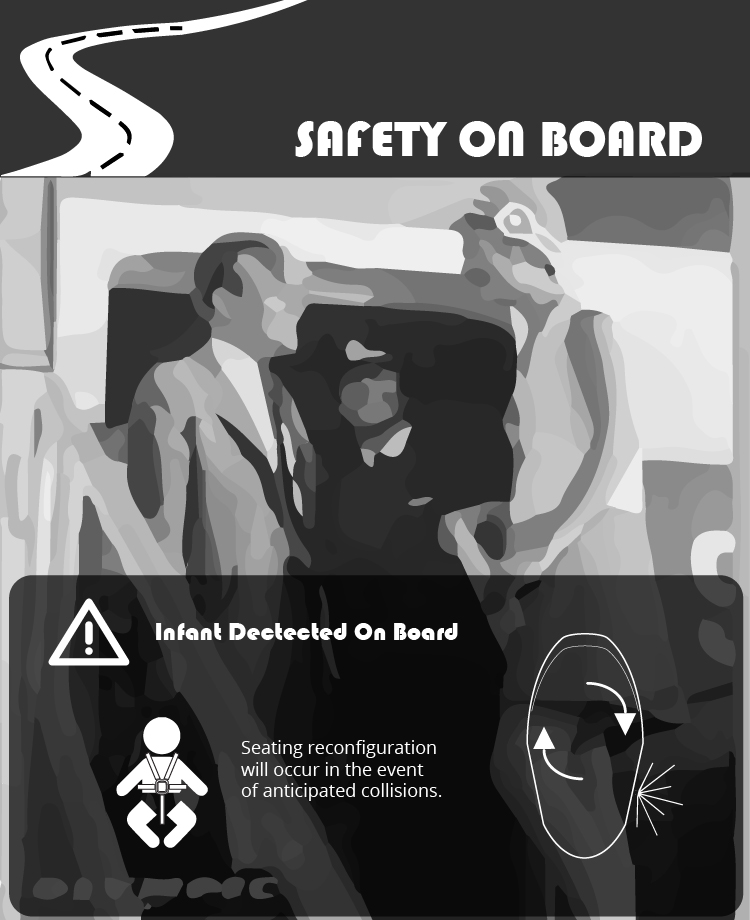Covalent
a transportation concept for the future of freedom
For my masters thesis at CIID's Interaction Design Programme, I explored the relationship between experiences of mobility and a sense of freedom among transportation users. Covalent, a speculative car-sharing service, invites the audience to a future scenario of intelligent transportation that enriches a user's relationship with freedom.
This 8-week project was comprised of 6 weeks of research and 2 weeks of concept development. The process included interviews with 30 transportation users, multiple prototype iterations, and co-creation sessions with Uber drivers and Thomas Bove of the Volvo UX Design team. Special thank you to Eilidh Dickson, my advisor throughout the thesis project and the year at CIID.
RESEARCH OBJECTIVE
Explore relationships with transportation, including the space both inside and outside of a plane, train, car, or other modes of mobility, and identify design opportunities within the realm of autonomous vehicles, personal spacecraft, or other innovative currents of transportation technology.
RESEARCH METHODS
Design games, observational case study, ethnographic interviews, future artifacts, cultural probes, experience prototypes and an immersive experiment with multiple interviewees in a vertical wind tunnel helped me build an understanding of our human relationship with mobility experiences.
With the evolution of transportation technology, mechanical control is shifting away from humans. From horses to self-driving cars, key parameters in the evolution of transportation include infrastructure, regulations, and profit.
My research for Covalent started by exploring a wide range of experiences with mobility from extreme sports to international business travelers. A rising trend in extreme sports, such as skydiving, base jumping, etc. has found more people voluntarily getting extreme with mobility experiences. On the contrary, evolution of transportation technology places the user in an increasingly more passive role. I set out to explore a tension between these two trends.
“Wingsuiting allows me freedom...and a heightened awareness of not just everything that I do, but a heightened awareness of living.”
How might future transportation HONOR THE complex relationships HUMANS HAVE with freedom?
Interview audio was recorded in Copenhagen during co-creations sessions with Thomas Bove, UX designer at Volvo. Video footage was filmed in Voreppe, France, for this project during a case study.
How might we bring forth the benefits of autonomous vehicles without sacrificing a sense of trust, control, and freedom?
research findings
Several themes came from the research with the strongest being a sense of freedom under the influence of trust and control as dynamic parameters. The chart below captures the research trends that came forth. Orange text indicates summarized interviewee quotes, while the green text indicates desk research synthesis. Themes are labeled in the center of the lateral axes.
IDEATION & PROTOTYPING
Early concept development included paper prototypes, design games, and screen mockups aimed at understanding the boundaries of the mental models users have with transportation.
Experience prototype sessions with Uber drivers, users of Tesla’s present day Autopilot software, and common car owners of Copenhagen yielded valuable insights about the complexities of freedom.
I studied airline safety cards as artifacts of user relationships to trust and control of transportation experiences and crafted speculative safety cards for autonomous vehicle experiences.
The first screen based prototype served as a mechanism for delivering an experience prototype to Uber drivers in Copenhagen.
The fidelity of the prototypes increased with understanding as I integrated feedback into the iterative prototyping phase of my project.
Concept
Covalent is a future-based autonomous car sharing service for a new relationship with freedom.
The name comes from covalent bonds which are between atoms with shareable electrons. Similarly, Covalent utilizes the times when autonomous vehicles are not being used by their owners to understand and serve the needs of other users at both the individual and community level. With intuitive AI, autonomous Covalent cars would blend the lines between personal transportation and mass transit.
Traditional car ownership means you have the freedom at any time to pick up the keys, walk outside, and go somewhere. The Take a Ride feature would aim to not only satisfy that original freedom experience we have with cars but advance it further with intuitive and seamless access to personal transportation.
Additionally, when "Request Destination from a Contact" is chosen destinations become living people moving about, rather than stationary coordinates. This eliminates the need for logistical coordination between two people wanting to meet up (eg "Hey where are you now? Where will you be in 20 minutes?") and enables users with a new sense of freedom to carry on with daily life.
Test drive the Covalent prototype here.

















